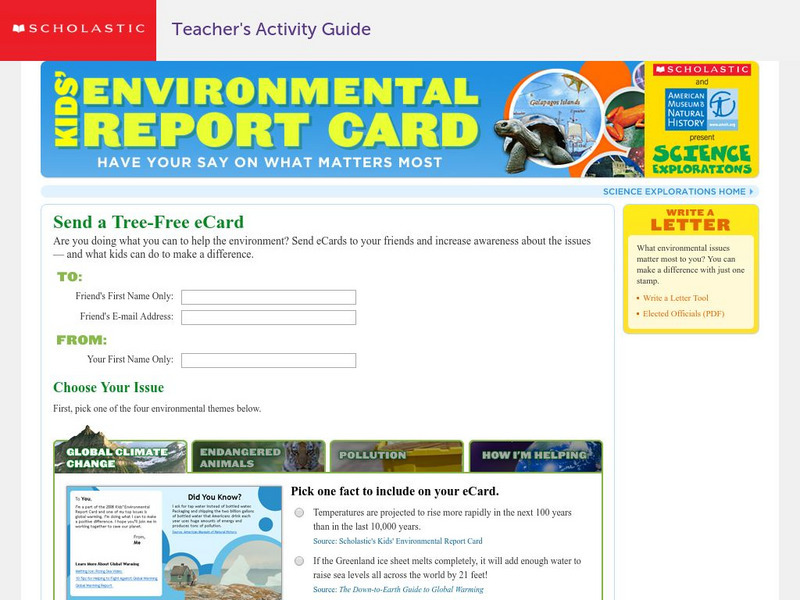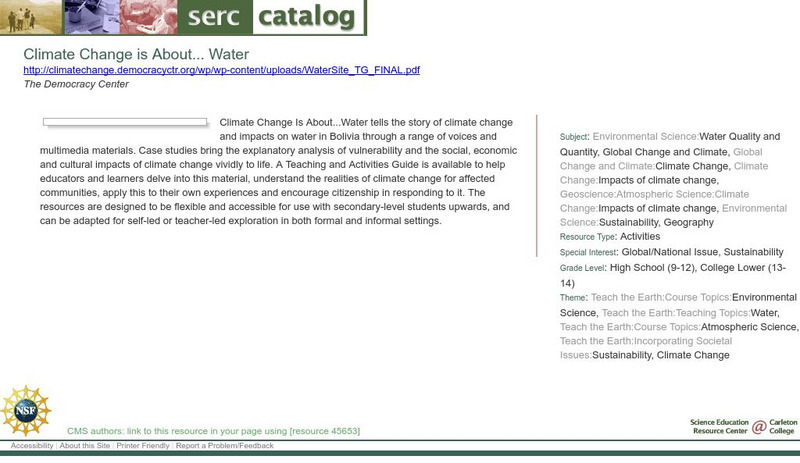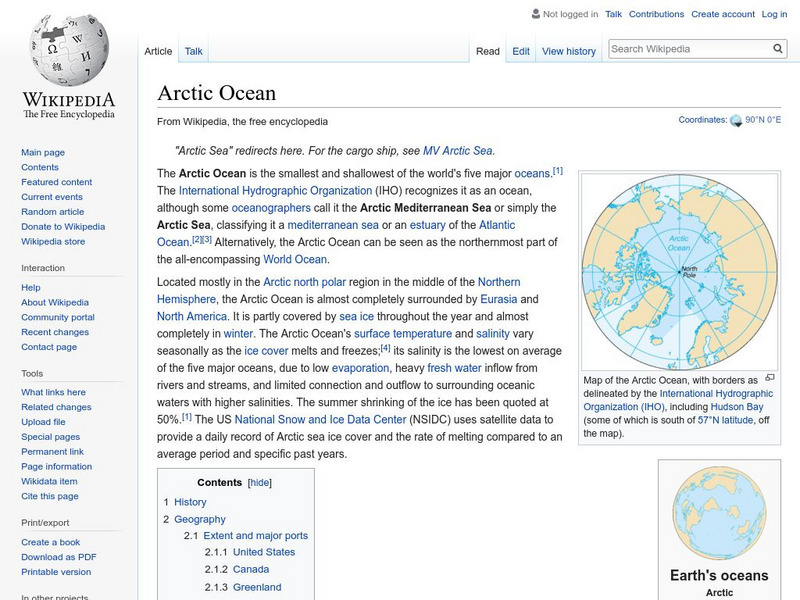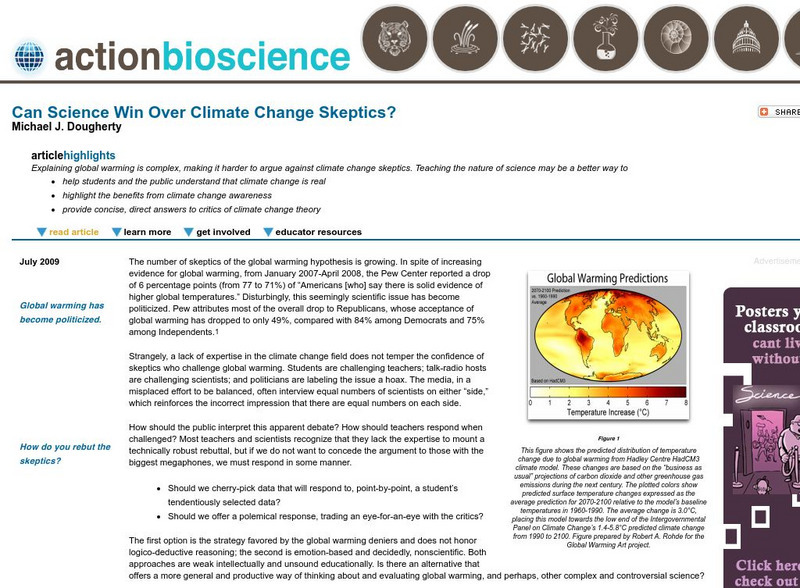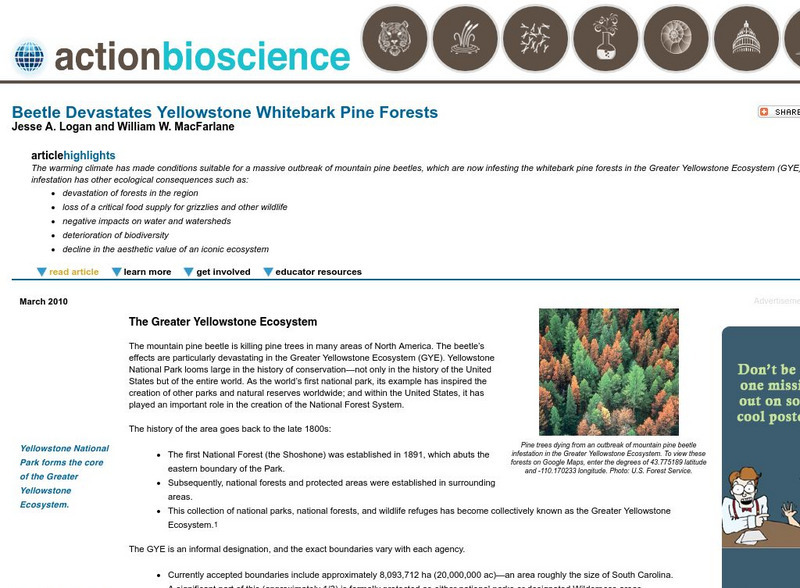Hi, what do you want to do?
Other
Skeptical Science: Global Warming & Climate Change Myths
A summary of global warming and climate change myths, sorted by recent popularity vs. what science says.
University Corporation for Atmospheric Research
Ucar: Climate Change and Vector Borne Disease
Vector-borne diseases are transmitted typically by the bite of an infected arthropod. Climate plays an important role in the seasonal pattern or temporal distribution of diseases that are carried and transmitted through vectors because...
University Corporation for Atmospheric Research
Ucar: Air Quality and Climate Change
Air pollutants have an impact on our planet's climate. Some pollutants cause the climate to warm, while others cause a temporary cooling effect.
CK-12 Foundation
Ck 12: Earth Science: Impact of Continued Global Warming Study Guide
A big-picture overview of humans' continued impact on global warming and climate change.
CK-12 Foundation
Ck 12: Earth Science: Global Warming Study Guide
Get a general overview of global warming using this study guide.
National Earth Science Teachers Association
Windows to the Universe: Changing Planet: Infectious Diseases Classroom Activity
Students will be introduced to the topic of infectious diseases in this lesson plan. While learning about how infectious diseases spread, they will learn how climate change is affecting the impact of these diseases. Includes printable...
National Earth Science Teachers Association
Windows to the Universe: Air Pollution
What do smog, acid rain, carbon monoxide, fossil fuel exhausts, and tropospheric ozone have in common? They are all examples of air pollution. This article describes the causes and effects of air pollution.
PBS
Pbs Learning Media: Observations of Climate Change
This interactive lesson introduces students to the various ways that people work to understand climate change, particularly in the Arctic.
Howard Hughes Medical Institute
Hhmi: Biointeractive: Understanding Global Change
Students will build models that explain how small changes in the Earth system's components and processes can produce measurable global effects.
PBS
Pbs Learning Media: Pov's 32nd Season Collection
POV's 32nd season highlights stories from women's perspectives on issues ranging from youth-led climate activism, domestic surveillance, rape culture, historical trauma, industrialized agriclture and others, with nine films showcasing...
PBS
Pbs Learning Media: Where Words Touch the Earth Collection
In this learning module, students from American Indian Tribal Colleges interview Elders, other students, and community members to provide a Native American perspective on climate change and its effects on their communities.
PBS
Pbs Learning Media: Bringing Global Climate Change Into the Classroom
Making Climate Change Relatable to Teens: The goal of my Earth and Environmental Science course is to provide students with the scientific principles, concepts, and methodologies required to understand the interrelationships of the...
University Corporation for Atmospheric Research
Ucar: Little Ice Age: Where Have All the Glaciers Gone?
In this lesson, students examine images of alpine glaciers to develop an under-standing of how glaciers respond to climate change.
Utah Education Network
Uen: Introduction to Climate Change
This is designed to be an introductory instructional activity to climate change. It covers the importance of the atmosphere, the basics of the "Greenhouse Effect" and an introduction to the human contribution to increased greenhouse gases.
University Corporation for Atmospheric Research
Ucar: Why Earth Is Warming
Over more than a century, the global average temperature warmed 1.5F (0.8C). Learn the science of why this has happened, and what the future holds.
University Corporation for Atmospheric Research
Ucar: Why Does Climate Change?
Factors that have the power to change global climate can be natural, like volcanic eruptions and changes in solar energy, or caused by humans, like the addition of greenhouse gases to the atmosphere.
Exploratorium
Exploratorium: Ice Stories: Dispatches From Polar Scientists: Greenhouse Gases
Polar scientists offer an article identifying the research and observations made on greenhouse gases. Why is there so much carbon dioxide in the atmosphere today? Scientists work diligently to determine the causes and effects of these...
Scholastic
Scholastic: Science Explorations: Kids' Environment Report Card
Cast your vote on the important environmental issues. Associated with each issue, there are at least three links to sites which can further your understanding of the issue. To encourage others to respect the environment, you can also...
Science Education Resource Center at Carleton College
Serc: Climate Change Is About Water
Through a range of voices and multimedia materials, discover the story of climate change and its impacts on water in Bolivia. Case studies bring the explanatory analysis of vulnerability and the social, economic and cultural impacts of...
Wikimedia
Wikipedia: Arctic Ocean
A wealth of facts is presented in this article on the Arctic Ocean. Content covered includes the area, natural resources, climate, terrain and much more.
American Institute of Biological Sciences
Action Bioscience: Can Science Win Over Climate Change Skeptics?
With many skeptical over the concept of climate change this article stresses that the best means to win them over is with scientific proof.
American Institute of Biological Sciences
Action Bioscience: Beetle Devastates Yellowstone White Bark Pine Forests
This article highlights the infestation of mountain pine beetles in Yellowstone White Bark Pine Forests. Find out the cause and effect of such an outbreak and explore supporting resources.
University of Wisconsin
Uw: Probabilities, Uncertainties and Units Used to Quantify Climate Change
This resource engages learners in using scientific data to analyze a 150-year dataset from Lake Mendota in Madison Wisconsin reflecting seasonal ice cover.
Smithsonian Institution
Smithsonian Education: Prehistoric Climate Change and Why It Matters
Through interactive and engaging learning site, students become the scientists and learn how to determine earth's temporal past.










